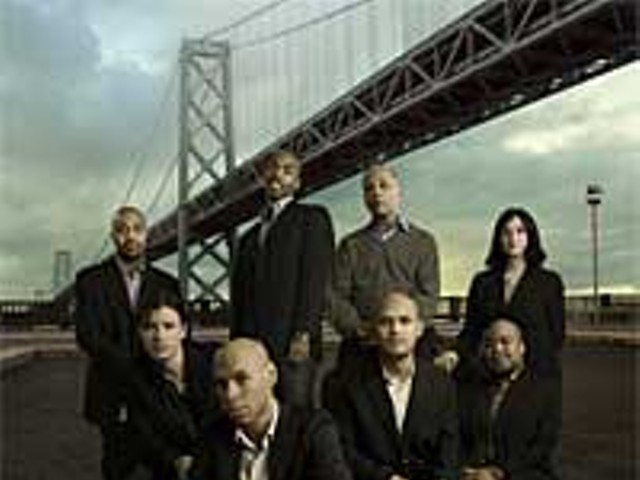On a frigid mid-February Friday night at Chicago hipster bar Schuba's, the Deadstring Brothers are cranking through a sweaty set in celebration of the release of their sophomore album Starving Winter Report.
Near the set's end, frontman Kurt Marschke boozily boasts from the stage: "We're just playing some tired old motherfucking music."
It's part self-effacing joke, part acknowledgment of the band's essence. And with a new album in stores and a massive tour underway, the band's anachronistic sound is poised for recognition.
You see, the Deadstring Brothers wear their country-rock influences on their sleeves (which would look even better if they were made by Nudie Cohn). The lazy man's explanation of the band's sound would go something like "equal measures Exile on Main Street, Highway 61 Revisited, Grievous Angel and Music from Big Pink." But that kind of reductionist description — while factually accurate — fails to capture the band's gestalt.
Degenerate country label Bloodshot Records released Starving Winter Report in February. If labelmates the Detroit Cobras play exclusively covers that sound like originals, the Deadstrings play mainly originals that sound so familiar they could be classic rock radio songs that you're not sick of yet.
"If I had to put everything on the line, this is the music that I would put on the line, because that's the music that I grew up feeling the most passionate about," says Marschke, the band's founder, frontman, lead guitarist and primary songwriter.
On Starving Winter Report, the group set out to "make a record sound like 1970," the singer says. The basic tracks were laid down with John Smerek at Detroit's White Room Studio. The album is filled with sonic textures — electric, acoustic and pedal steel guitars, rich and swirling organs and electric pianos, stabbing horns, harmony vocals — that lend depth.
"You can try as hard as you want to sound like something, but at the end of the day I think the sound will be unique from the fact that we're doing it," Marschke says.
Though the Brothers would never be confused for the Stooges, the band has a little more bluster than its "alt-country" brethren — which could be attributed to Detroit's innate rock 'n' roll attitude.
"I think we're a little more rock 'n' roll about what we're doing," Marschke says. "It's a little bit more threatening than some of these really tame Americana things."
The group's current repertoire draws almost exclusively from Marschke's pen. His lyrics are imbued with cinematic imagery and existential heft — and just how autobiographical they are seems questionable.
"Some of them are specific and some of them aren't," Marschke says. "It would probably be hard for anybody other than me to discern which is which."
But Marschke seems surprised, for example, when informed that death is a recurring theme in the lyrics on Starving Winter Report.
Backup singer (and Marschke's off-stage partner) Masha Marjieh says sometimes she asks him where his songs come from. "He can't really give me a straight answer," she says. "I don't think he even really knows."
Marschke has been a fixture on the Motor City scene for years, notably gothing it up with Caelum Bliss. By the turn of the century, he found work in Sponge — a gig that gave him the financial wherewithal to pursue his own musical vision.
"I finally hooked up with a gig that actually paid good money, and that was right when I started doing the Deadstring Brothers," Marschke says. "I was doing really well financially with that. That's actually how I was able to put together the studio that we started the Deadstring Brothers in."
That studio, in Marschke's loft at the time, is where the Deadstring Brothers recorded and mixed their self-titled Times Beach debut album. At that time, it was more of a studio project than a full-fledged band. Marjieh appears on the record and joined as a full-time member shortly after its 2003 release. Bassist Philip Skarich (also of the Witches) climbed aboard early on as well.
"When I heard his demos, it had that kind of intangible element of not being derivative but the essence of what that music was about was there. And that's something that you don't find very often," Skarich says.
It's a good, although imperfect debut. "If you look at it from a technical standpoint, it's probably not that good," Marschke says. "I hear a lot of mistakes."
Marjieh rebuts: "I just hear beauty."
After the first record, the band earned a sizable following in Britain and across Europe, thanks to frequent touring. But they remain largely unfamiliar around Detroit (and much of the United States, for that matter). Dodgy distribution led the group to forgo much touring stateside — a decision Marschke in hindsight says may have been a mistake.
Detroit "wasn't a town that we worked seriously," he says. "As soon as that first record came out we went to England and started working there a lot."
Onstage, it's clear Marschke's experience playing big gigs with Sponge has paid off — his windmill guitar moves show the comfort of someone who is used to projecting on much larger stages.
Marschke (who was aptly described in Metro Times four years ago as "all lithe with bony shoulders and a milk-white derma") cuts a dramatic contrast next to the coffee-skinned Marjieh, who radiates a mysterious and joyful sensuality onstage. Skarich is MTV pretty, with his beat-up Chuck Taylors, ironic sparkly KISS belt buckle and aloof demeanor (lest you think I'm being insulting, quite the contrary — he seemed to be the center of an enviable amount of female attention at Schuba's). Drummer E. Travis Harrett and keyboardist Ross Westerbur (also of Aquarius Void) sport the facial hair and vintage-looking duds to be extras in The Last Waltz.
The touring lineup is rounded out with pedal steel player Tommy Spurlock. The Texas-based musician boasts an impressive list of credits — including work with Emmylou Harris, George Jones, Highway 101 and the post-Robbie Robertson incarnation of the Band. His work on the electric table frequently steals the show in Chicago.
How did Spurlock get involved with the Deadstring Brothers?
Somebody had sent Spurlock an MP3 of the Deadstring's cover of the Band's "Get Up Jake," and after doing some research, Spurlock was inspired to contact Marschke.
"He told me a little bit about himself and then he told me he was going to play pedal steel in the band," Marschke says. Taking a look at Spurlock's pedigree, the offer almost seemed too good to be true.
"I asked him 'Are you crazy? Are you a drunk?' and he said, 'Naw, man, I just like to play music and you guys are real good,'" Marschke says, mimicking Spurlock's drawl.
With the touring lineup set, the Deadstrings plan on logging many road miles this year. They returned to South by Southwest in March for a Bloodshot showcase with labelmates Scott H. Biram and Bobby Bare Jr. After the current U.S. tour ends at the Magic Bag this week, the band heads to England.
"I'd rather just fucking live in some dumb time capsule and make these records and have a small little segment of people identify with it," Marschke says. "And that's so we can go on the road and be stupid and break stuff and do what we do when we go out."
The local record release show is Friday, March 31, at the Magic Bag, 22920, Woodward Ave., Ferndale; 248-544-3030.
Brian J. Bowe is a freelance writer and editor of Creem magazine. Send comments to [email protected]




